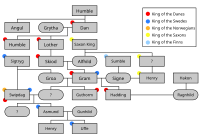Gríðr
| Characters of Gesta Danorum |
|---|
 |
| Danish kings |
| Foreign rulers |
| Other men |
| Women |
Gríðr (Old Norse: [ˈɡriːðz̠]; or Gríd) is a jötunn in Norse mythology. She is the mother of Víðarr the silent and the consort of Odin.[1] Saturn's moon Gridr was named after her.
Name
The poetic Old Norse name Gríðr has been translated as "vehemence, violence, or impetuosity".[2][3][4] Its etymology is unclear.[2]
Attestations
Prose Edda
In
Thor lodged for the night with a giantess called Grid. She was Víðarr the silent's mother. She told Thor the truth about Geirrod, that he was a cunning giant and awkward to deal with. She lent him a girdle of might and some iron gauntlets of hers, and her staff, called Grid's pole.
— Snorri Sturluson, Skáldskaparmál, 18, trans. A. Faulkes, 1987.
Gríðr is also mentioned in a list of troll-wives ("I shall list the names of troll-wives. Grid and Gnissa, Gryla...").[5]
Skaldic poetry
Gríðarvöl (Gríðr's staff) is also mentioned in the poem Þórsdrápa by the late-10th-century skald Eilífr Goðrúnarson.[6]
The feller of the dolphins of the steeps [giants] advanced with violent temper with Grid's pole.
— Eilífr Goðrúnarson, Þórsdrápa, trans. A. Faulkes, 1987.
Gríðr appears in 10th-century kennings for 'wolf' (the steed of troll-wife) and for 'axe' (that which is dangerous to the life-protector, i.e. shield or helmet).[7]
Battle raged when the feeder of Grid's steed [wolf], he who waged war, advanced with ringing Gaut's [Odin's] fire. Weird rose from the well.
— Kormákr Ögmundarson, Skáldskaparmál 49, trans. A. Faulkes, 1987.
Riders [seafarers] of Ræfil's land's [sea's] horses [ships] can see how beautifully engraved dragons lie just by the brow of the Grid of the life-protector.
— Einarr Skúlason, Skáldskaparmál 49, trans. A. Faulkes, 1987.
Other texts
Saxo Grammaticus refers to her as Grytha, the wife of the legendary king Dan I of Denmark, "a lady whom the Teutons accorded the highest honour".[8] A witch of the same name appears in Illuga saga Gríðarfóstra.[9]
Theory
Her role as the donor of information and necessary items to the hero has been analyzed by folklorists as a commonplace of folk narrative.[1]
Notes
- ^ a b c Lindow 2002, p. 149.
- ^ a b de Vries 1962, p. 188.
- ^ Simek 1996, p. 117.
- ^ Orchard 1997, p. 61.
- ^ Faulkes 1987, p. 156.
- ^ Faulkes 1987, p. 84.
- ^ Faulkes 1987, pp. 121, 238.
- ^ Fisher 1999, pp. 1:14, 2:26.
- ^ Lavender 2015, p. v.
References
Bibliography
- ISBN 978-90-04-05436-3.
- Faulkes, Anthony, trans. (1987). Edda (1995 ed.). Everyman. ISBN 0-460-87616-3.
- Fisher, Peter, trans. ISBN 085991-502-6.
- Lavender, Philip, ed. and trans. (2015). Illuga Saga Gríðarfóstra: The Saga of Illugi, Gríður's Foster-Son (PDF). Viking Society for Northern Research, University College, London. ISBN 978-0-903521-91-8.
- ISBN 978-0-19-983969-8.
- ISBN 978-0-304-34520-5.
- ISBN 978-0-85991-513-7.
